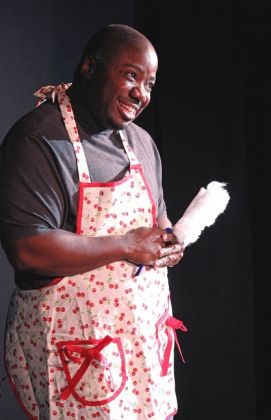
Don't be misled by the P-word. Even if our hero makes his entrance garbed only in his underwear (plain white cotton jockeys, for those who care about such details) to inform us that he used to be a woman, he has not come to talk about hormones or implants or rejecting one gender stereotype in order to embrace another. Instead, his goal is to question—having, he reminds us, viewed the arguments from both sides—why our culture makes it so difficult for men and women to be who they really are. To establish a baseline, he first assumes the persona of a gravel-voiced drill-sergeant instructing young males in recall of athletic stats, the necessity for automotive expertise and "parking your tear ducts at the door." In contrast to this testosteronic caricature, Jamie Black next portrays a mid-20th-century housewife, serenely sequestered within marital/consumer/domestic spheres and armored in apron, ignorance and enigmatic smile. The persistence of these restrictive roles is then illustrated in three scenarios, each recounted, “Rashomon”-style, from the divergent vantages of the participants, beginning with a shy fraternity pledge who frets over the trauma he may have inflicted upon the tomboyish "fat girl" ("Not Biggest Loser fat, but more like Jenny Craig fat") assisting in his sexual initiation, little realizing that his poker-playing paramour compensates for her feminine shortcomings by means of the same seductive subterfuges employed by callous males. More destructive consequences beset marriage partners concealing dissimilar expectations regarding emotional expression and privileged candor—a husband who "snaps" after years of verbal abuse is not afforded the same sympathy extended to a wife spurred to violence. An elderly couple forging an egalitarian relationship, however, find themselves at the end of long and happy lives secure in the satisfying knowledge that there wasn't any "unfinished business" between them. Black appears determined to leave nothing unfinished or unsaid, either, punctuating his character portraits with homilies pointing us the way—"Be vulnerable!" "Be brave!" "Be you!" Stoic playgoers may be skeptical of attributing panaceic properties to a remedy as simple as a good cry or heart-to-heart, but there can be no denying our narrator's benevolent intent in promoting more fluid boundaries to individual gender identities.
